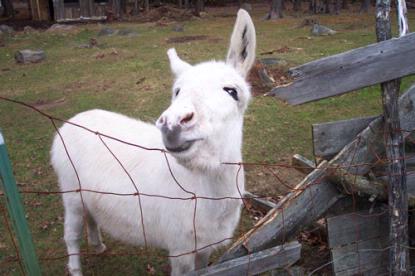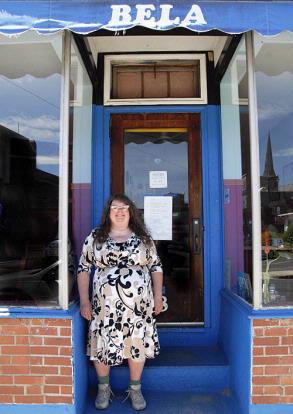
Last Friday night, I went out to eat at Bela in Northampton. I got there early on my trike, so I leaned on it and watched from a little way down the sidewalk as people went in. Bela is a small, warm vegetarian restaurant with lovely food, and I’ve had some really gorgeous moments there. (For instance, my friend Sally Bellerose took me out there to celebrate when my first novel was accepted for publication in the mid-nineties.) Lingering on the sidewalk to wait for my companions was made even more sweet than gathering for a good meal at the end of a very rough week would usually be because there was a poem I had written hanging on the front door.
It’s a poem about a garden, some marigolds, sunflowers, tomatoes, basil, kale, birds and a donkey. The garden belongs to my companions, who start seedlings in February and have just been finishing a new fence to try to keep bears and rabbits out. I get to weed a little every now and then. The warm dirt and the scents on my fingers as I do that are so sensual and elemental that they often move me to poetry. Often enough, maybe, to give the impression that I work more in the garden than I actually do.
Forty-odd restaurants, bakeries, ice cream parlors and bars are currently displaying poems by local poets as part of the Nourish the Body/Nourish the Soul project organized by Rich Michelson, Northampton’s Poet Laureate. It is a rare and specific pleasure to get to stroll through the streets of the town where I live, browsing poetry hung in so many windows. It brings me such a sense of celebration and wholeness to have one of my poems among them, to have the work of my heart be a part of the daily lives of neighbors and people passing through. It is a writer’s dream, so strangely elusive, so satisfying when reached.
Bela had given the generous gift of a meal in exchange for the poem. So we ate, my hard-working  companions and I. The server’s face lit up when I told him that the poem on the door was mine. “It’s a good poem,” he said.
companions and I. The server’s face lit up when I told him that the poem on the door was mine. “It’s a good poem,” he said.
He brought us beautiful food: a salad with sweet peas, spicy tofu with collards in red curry sauce, rice noodles with gorgonzola and asparagus. We drank beer we had brought from chilled glasses, and I got to watch a few people, waiting, reading my poem. The time, work, patience, inspiration, commerce and love that had gone into the garden, the poem and the meal were palpable at the table.
Then, we hurried up the street to the Parlor Room to hear cellist and singer Ben Sollee, performing with percussionist Jordon Ellis. They were doing about a third of their tour on bikes, Ben with his cello strapped on and Jordon pulling a trailer full of gear. Solee is influenced by bluegrass, R&B and his own engaged sensibility. It had, it had been a hard week, and it was a perfect moment to hear his songs “Boys Don’t Cry” and “Panning for Gold,” in which God says, “Son, I used to know where I put things, I used to know.”
When Jordon got up from banging and brushing his box and drum to play the body and strings of the cello with his sticks while Ben played, too, we were invited to hear a song rising from having pedaled forty miles and hit a groove. I heard it. I heard movement. I heard possibility and life.
Here’s the poem:
Garden
My fingers are scented
from pushing through marigolds
to reach the tomatoes
and stripping flowering basil
of puckered leaves.
Birds thrash the air
on sharp paths to the sunflowers.
It’s a tall year for corn.
The donkey is
insisting, strenuously, on breakfast.
I take one leaf of kale
– early, bitter, lush–
to eat in the valley,
once you drive me home.
Photos top to bottom:
Moffat the donkey, by Susan Stinson
Susan Stinson in front of Bela and her poem, by Jeep Wheat


